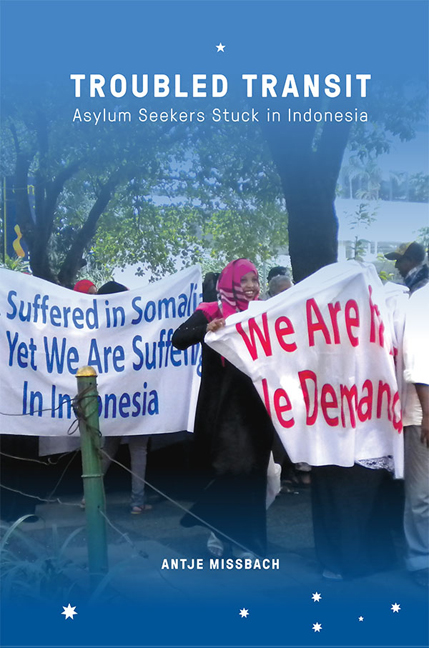Book contents
- Frontmatter
- Contents
- List of tables
- Acknowledgements
- Map of Indonesia
- Acronyms and Initialisms
- 1 Introduction
- 2 Transiting Indonesia: Past and Present
- 3 The Politics of Detention
- 4 Life on Hold
- 5 The Limits of Protection
- 6 Indonesia as a Transit State: Obligations, Policies, and Practice
- 7 Tidal Ebb and Flow: The Indonesia-Australia Relationship
- 8 Selling Hope
- 9 Conclusion
- Bibliography
- Index
- About the Author
- Frontmatter
- Contents
- List of tables
- Acknowledgements
- Map of Indonesia
- Acronyms and Initialisms
- 1 Introduction
- 2 Transiting Indonesia: Past and Present
- 3 The Politics of Detention
- 4 Life on Hold
- 5 The Limits of Protection
- 6 Indonesia as a Transit State: Obligations, Policies, and Practice
- 7 Tidal Ebb and Flow: The Indonesia-Australia Relationship
- 8 Selling Hope
- 9 Conclusion
- Bibliography
- Index
- About the Author
Summary
What makes waiting so difficult is not the weeks and months,
but it is waiting for the days and hours to pass.
(Interview with Tamil refugee in Indonesia, 15 June 2010, Cipayung)
While in transit in Indonesia, transit migrants generally view the ability to move on as one of their most important resources, being at a standstill uses up time and money, and the tedium of an indefinite wait gives rise to downheartedness. In her study of transit migrants stuck in North Africa on their way to Europe, Aspasia Papadopoulou-Kourkoula (2008, p. 14) found that “the time spent in transit is frequently time being wasted with the rebuilding of the migrant's life put on hold”. Similarly, Ghassan Hage (2009, p. 97) equates waiting with “stuckedness” and calls it a “sense of existential immobility”. As mentioned earlier, transit migrants in Indonesia often spend several years in limbo before moving on. Waiting, which may result from any of a number of factors, such as lack of regulation and law enforcement, slow processing of refugee applications, and limited resettlement options, is a means to an end.
The lynchpin of this chapter is the “politics of waiting” and their role in deterring other potential transit migrants. The chapter examines the nature of the time transit migrants spend waiting, often indefinitely, for registration as asylum seekers, for the outcome of the process of determining refugee status and for resettlement. Waiting for these outcomes puts them under great stress, and some threaten to harm themselves or commit suicide if their applications are rejected.
This chapter portrays the experience of transit migrants whose lives are put on hold. Based on the fundamental principle that “being in transit is a condition of increased vulnerability, characterized by poverty, insufficient protection, insecurity and social exclusion” (Papadopoulou-Kourkoula 2008, p. 142), the main foci of inquiry are the housing, income generation, access to health services and education of transit migrants. The chapter takes into consideration the ethnic background, class and gender of transit migrants and examines the extent to which these factors determine the length and the conditions of their time in transit. It does not, however, analyse particular ethnic groups of transit migrants and their experiences in transit, even though the experiences of different ethnic groups do vary in regard to housing, income generation, onward migration and prices for people-smuggling.
- Type
- Chapter
- Information
- Troubled TransitAsylum Seekers Stuck in Indonesia, pp. 90 - 116Publisher: ISEAS–Yusof Ishak InstitutePrint publication year: 2015



